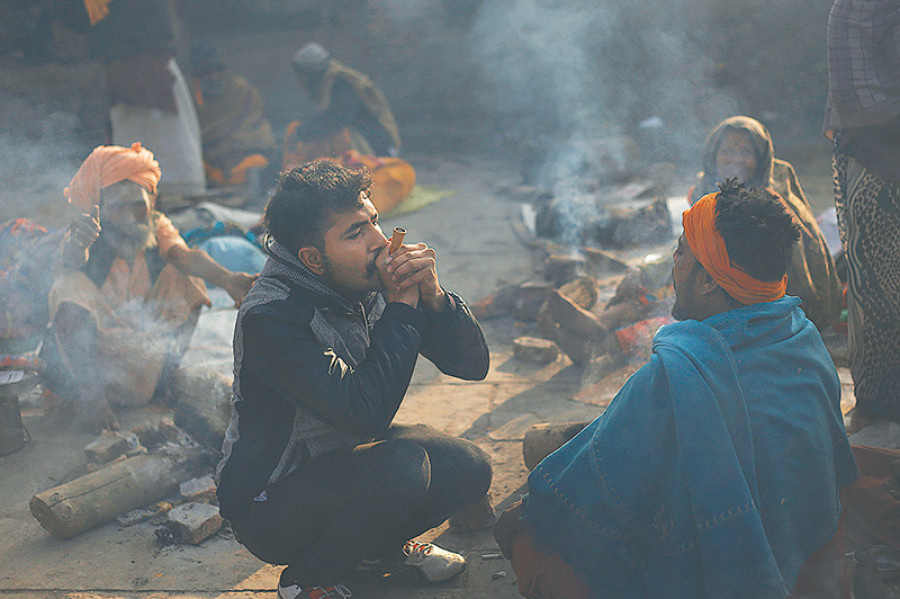Valley
Police to arrest cannabis users at Pashupati this Mahashivaratri festival
Smoking marijuana has become a norm of sorts for many people who visit the Pashupati temple on the Mahashivarati festival.
Anup Ojha
Smoking marijuana has become a norm of sorts for many people who visit the Pashupati temple on the Mahashivarati festival.
Its use is associated with Lord Shiva and on the day of the festival, taking a puff of a cigarette or a pipe containing marijuana buds passed around or sold by sadhus is seen as an homage to the Mahadev, the great god.
Although the government classified marijuana and its derivatives as drugs and banned their use and sale in 1973, the authorities have been tolerating their uses during Mahashivaratri. This, perhaps, has partly to do with the religious significance. And
at the same time, the sheer number of people indulging in ganja on the festival
makes one think that maybe the law enforcement agencies cannot control their action. Rounding them all up would be unrealistic, hence the sensible thing to do is to leave the revellers to their own devices, that is as long as they do not cause social
disturbances.
Come Tuesday, the Pashupati temple premises will be teeming with tens of thousands of people attending the Mahashivaratri festival.
Around 2,000 sadhus have already arrived from different parts of the country and from India, according to the Pashupati Area Development Trust (PADT).
The trust is aware of the cannabis smoking and selling that transpired on the temple premises during previous Mahashivaratris. This year, however, it plans to strictly monitor the use and sale of cannabis.
PADT Executive Director Ramesh Upreti says while the sadhus will be exempt from smoking, the visitors will be arrested if caught smoking or for possession.
“We have already instructed the sadhus not to sell or offer marijuana to the visitors this year. There will be police deployment on the temple premises to ensure that,” Upreti said.
The Metropolitan Police Circle, Gaushala, will be working together with the PADT to monitor the activities of the revellers visiting the Pashupati temple on Mahashivaratri.
The police unit, which is located right at the main entrance to the Pashupati temple area, is already on the case it seems.
In the past five months, officers from the Gaushala station rounded up around 300 people for the use and possession of marijuana, hashish and kief.
A staggering 15 kg of marijuana and 5 kg of hashish were recovered from them, according to DSP Anupam Shrestha.
Those caught in possession of high quantities were charged under the Narcotic Drugs (control) Act 1976, nearly 200 youngsters caught smoking were warned and handed over to their parents, and more than 30 were admitted to rehabilitation centres at their parents’ requests.
“Our response to use of marijuana on the day of Mahashivaratri festival will remain unchanged,” DSP Shrestha said.
He believes that Mahashivaratri has become the day when many youngsters start smoking due to peer pressure, thus getting at risk of becoming habitual smokers before picking up stronger and more addictive drugs.
“This Mahashivaratri smoking trend is pushing our youths to the brink of addiction. That is why we have decided to take a stringent measure against use, sale and possession of marijuana on the day of the festival as well,” DSP Shrestha said.
The PADT will be mobilising 2,500 volunteers on the Pashupati premises for
crowd management and security for the festival. The volunteers will be supported by 7,000-strong security personnel.
The legality debate
Debate over legality of marijuana use has become more prominent and mainstream with many western countries relaxing their cannabis law after seeing their many tried and tested medical benefits. These days many believe that the government should reconsider its ban on marijuana.
Dr Hari Dev Yadav, of Singhadurbar Vaidyakhana, says marijuana plants have a great significance in Ayurveda, but because of the government ban they cannot use them to prepare medicines. “If the government were to legalise or regulate it, not only the Ayurvedic community will be thankful, but there is also income to be made off it,” said Yadav.
Many countries have legalised marijuana for medicinal use, including Australia, Greece, Croatia, Israel, Poland, Mexico, Finland, Czech Republic, Switzerland and Italy.
In Chile, the South American country with the highest per capita marijuana use, the consumption and production is illegal, but it is permitted to grow up to six plants in a private home for ‘medical’, recreational and spiritual reasons.
Meanwhile, Uruguay, the Netherlands and Jamaica are some of the most accepting nations when it comes to marijuana consumption.
PADT Executive Director Uprety said the trust itself used to distribute marijuana to the sadhus who visited the Pashupati temple during the Mahashivaratri festival until 1995.
“The sadhus were given marijuana confiscated by the Home Ministry. But the practice was ended at the instruction of King Birendra,” he said.
DSP Shrestha at the Metropolitan Police Circle, Gaushala, meanwhile, is of the view that until the law says otherwise it is their duty to arrest those who are found carrying or using marijuana.




 13.56°C Kathmandu
13.56°C Kathmandu.jpg)














